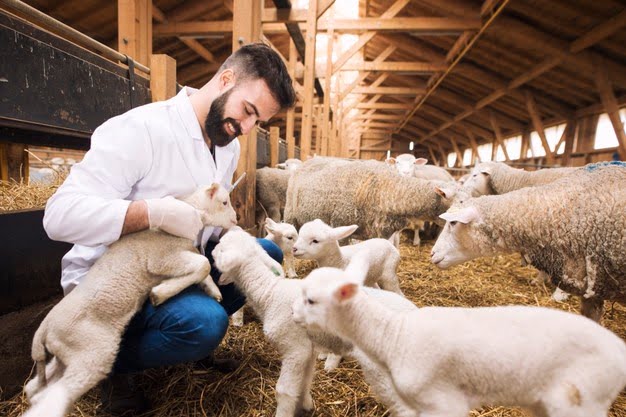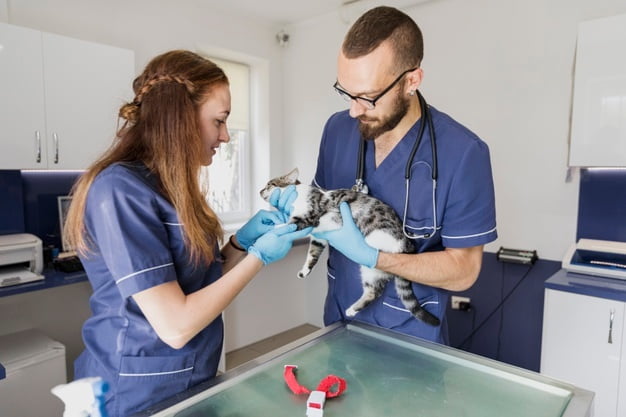Table of Contents
Veterinary doctor | An introduction
Veterinary Science is a highly respected profession everywhere in the world. Not only that, but it is also a lucrative career option for those interested in the welfare of animals. Becoming a veterinary doctor is a popular choice, mostly amongst students who have a passion for medicine as well as helping animals. If you are one of them, this guide will show you how to become a successful veterinarian.
Who is a veterinary doctor?
Before getting into all the details about how and why to become a veterinarian, you must know what exactly these doctors do.
A veterinarian is a specialist doctor for animals of all kinds. They have different specializations like-
Animal behavior, nutrition, and welfare
Have you always been curious about why animals behave the way they do? Then you can specialize in animal behavior, nutrition, and welfare as a veterinarian. Apart from animal psychology, this field will also teach you about the nutritional requirements of animals and the several legal and ethical guidelines that revolve around working with them.
Infectious diseases & zoonoses

This is one of the most sought-after specializations for most veterinary doctors. This is because it imparts in-depth knowledge about vaccinations, biosecurity emergency management, and zoonosis protection programs. With this specialization, you could also venture into scholarly research in the field of veterinary science.
Reproductive biology
This field will be most suitable for aspirants who seek to establish themselves in the livestock and animal husbandry industry. In this specialization, you will learn about animal fertility, reproduction, development, and life cycles. You can then go on to be a specialist in private or government animal husbandry organizations.
Veterinary epidemiology & public health
On the other hand, if you are more inclined towards deciphering all things related to animal diseases, then this specialization is perfect for you. This field will teach you all about the different patterns of animal disease epidemics and disease modeling.
Skills you need to become a veterinary doctor
There are several skills, both transferable and non-transferrable, that you will need to develop in order to become a successful veterinarian. One of the most important transferable skills is thinking critically and having an investigative bent of mind. A few others include –
- Ability to understand symptoms and signs of distress. This is one of the toughest skills to develop as a veterinarian. Since your patients cannot speak, you will have to look for telltale signs of distress and other symptoms to make an accurate diagnosis.
- Knowledge of diagnostic testing. As a veterinary doctor, you will also have to get involved with diagnostic testing. Therefore, you need to have basic as well advanced laboratory research skills.
- Basic clinical skills. These skills help you inspect and diagnose animals accurately.
- Keep up with the latest veterinary developments. You should be able to interpret scientific literature and also remain updated about the latest trends and forms of treatments being researched.
- A good foundation in biology. Moreover, you will need a decently strong base in the fundamental concepts of biology.
- Communication skills. Since you will not only be dealing with pet animals but also their owners, communication will be an important part of the job. You should be able to appease upset owners and also manage any other conflicts that may arise.
Subjects you will learn in a veterinary course

The discipline of veterinary science is a vast one. This means you will have to study a huge list of subjects. Although a veterinary science course syllabus can vary from university to university, a few common subjects are taught in almost all of them.
Here is a list of some of the subjects that you can expect to study in any veterinary doctor course –
- Veterinary Osteology
- Biochemistry in Animals
- Veterinary Virology
- Animal Histology
- Veterinary Myology
- Animal Husbandry
- Veterinary Hygiene
- Pharmacology
- Veterinary Gynaecology
- Clinical Abnormalities
- Veterinary Reproduction
- Anaesthesiology
- Veterinary Diagnostics
- Spermatogenesis
- Veterinary Immunology
- Ethics and Animal Welfare
- Animal, Birds and Aquatic animal diseases
- Veterinary Surgery
- Animal Healthcare Management
- Veterinary Epidemiology
- Animal Nutrition
- Animal Genetics
How to become a veterinary doctor?
The eligibility criteria for a veterinary course may differ from region to region. However, some qualifying factors are usually common to all parts of the world-
- High school diploma from a recognized institution with an aggregate grade of at least 50%.
- You should have studied a combination of Physics, Chemistry, and Biology in your high school to qualify for any veterinary science course entrance exam.
- You should also have a decent score in the respective entrance exam, as per the guidelines of the university that you are applying to.
- If you have completed your undergraduate degree in any other field, you can still enroll yourself for a veterinary science undergraduate degree.
- Regarding the age limit, the lower age limit for applying to a veterinary science undergraduate program is 17 years, and the upper age limit is 27 years. However, these age limits are subject to change depending on where you pursue the course.
Veterinary doctor course details
Different countries have veterinary science courses registered under various universities. However, in most places, the typical veterinary doctor degree at the undergraduate level spans anywhere from 3 to 6 years.
Course Duration
For example, an undergraduate course in veterinary science in the USA and Canada is usually for 4 years. On the other hand, most European universities have veterinary science courses that take 6 years to complete. The veterinary science courses in Asian countries like China, India, and other parts of South and Southeast Asia are usually for about 5 and a half years.
Course Fees
Just like the course duration, the course fees are also widely varied. For example, the course fees in the USA are about $200,000 to $275,000, and the same in Canada can be around $70,000. On the other hand, the course fees in European countries could be anything between $45,000 and $50,000.

However, if you are looking for a more affordable alternative, then you might consider the countries of Asia in the south and southeast. Here, the same course fees could be just around $500 to $1500.
Top universities to study veterinary science
Listed below are some of the top universities in the world to study veterinary science. You can find undergraduate and graduate programs in various specializations at these universities. Some of them also offer research programs for those who wish to enter the research part of the field.
- University of Cambridge
- Royal Veterinary College, London
- University of California, Davis
- University of Edinburgh
- Cornell University
- University of Guelph
- Utrecht University
- Ohio State University
- University of Copenhagen
- University of Glasgow
Key takeaways
- If you wish to become a veterinary doctor and pursue your passion for helping animals around you, these are some things you should know.
- First and foremost, it is important that you have a decent grade at the high school level in pure science subjects.
- Without a fundamental understanding of the pure sciences, you will not be able to enroll in a veterinary science course.
- If you have plans to become a veterinarian, remember to choose the science stream right after completing your class 10 level at school.
We hope you enjoyed reading this blog. In case of any queries, reach out to us or drop a comment below!
Liked this blog? Read next: Animal behavior and psychology
FAQ
Q1. Is it harder to become a doctor or a veterinarian?
Answer- Each profession has its own difficulties. It depends on what profession you are more drawn to. If you are passionate about helping animals and have a scientific bent of mind, then becoming a veterinary doctor will be easier for you.
Q2. What are the qualifications of a Veterinary Doctor?
Answer- The qualifications may vary from country to country for veterinarians. For example, in some countries, the qualification is referred to as Doctor in Veterinary Medicine (DVM). In some other countries, it is known as Bachelor’s in Veterinary Science (BVSc).
Q3. What is a Veterinary Doctor’s salary?
Answer- In Asian countries, a veterinarian may earn anything between $3,000 and $46,000 annually. In America, this pay scale would go up to $95,000 annually, and the same in European countries could be around $50,000 annually.







